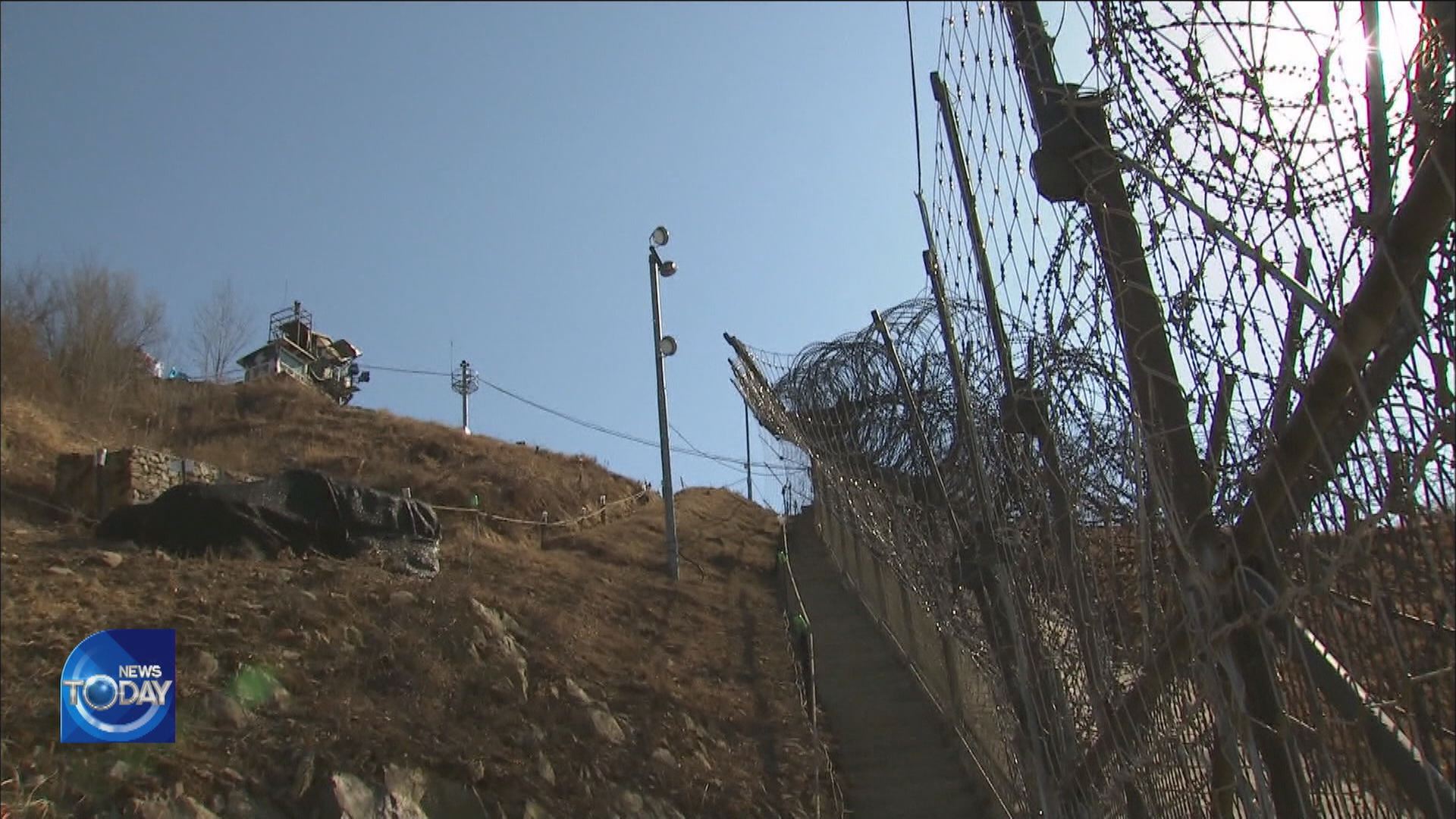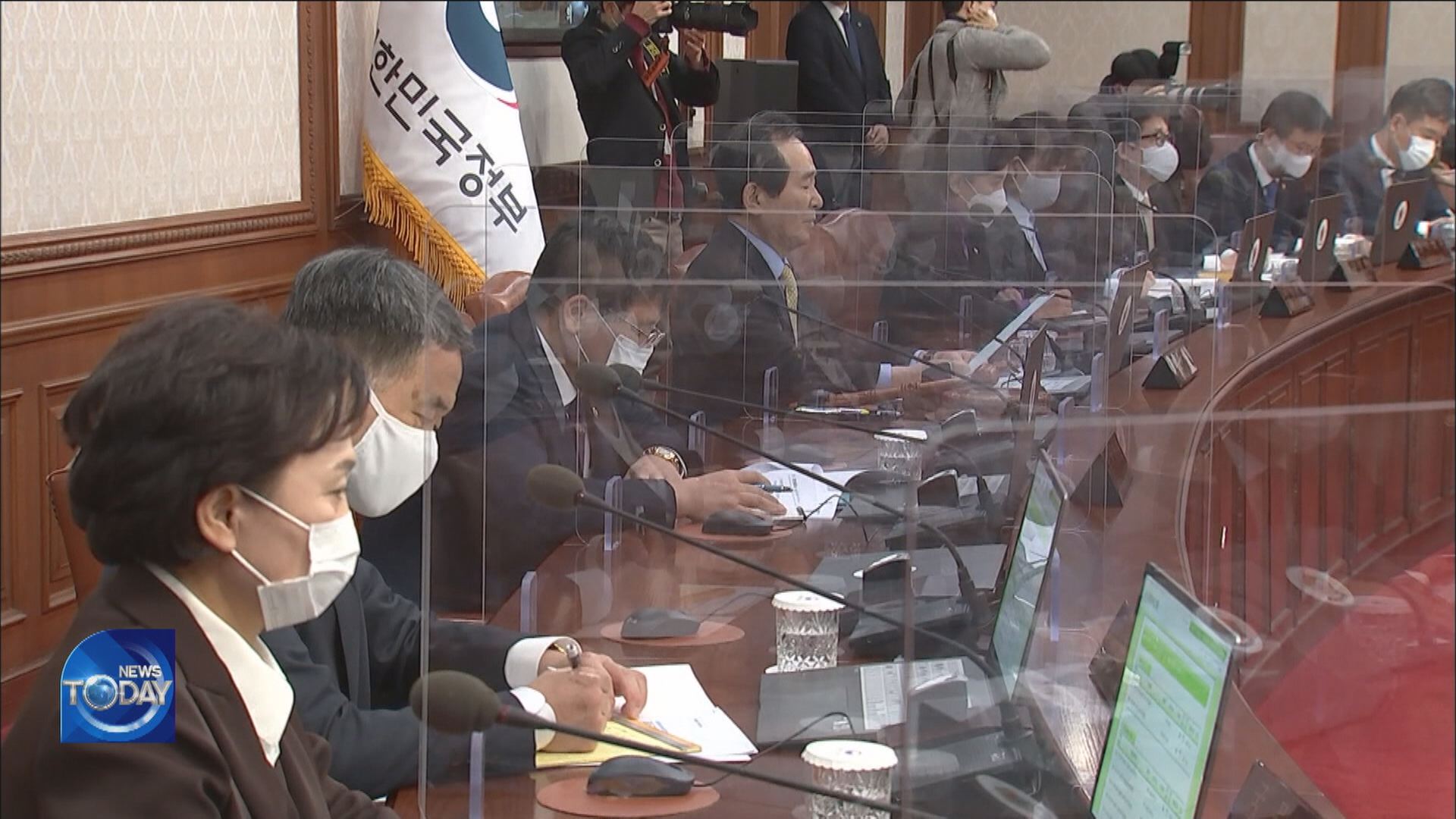SURVEILLANCE SYSTEM UNDER FIRE
입력 2020.11.10 (15:11)
수정 2020.11.10 (16:45)
읽어주기 기능은 크롬기반의
브라우저에서만 사용하실 수 있습니다.
[Anchor Lead]
Questions are being raised as to why no alerts were sounded along the inter-Korean border when a North Korean man crossed barbed-wire fences into the South last Tuesday. This incident has come to show that modernized military surveillance system, which cost hundreds of billions of won, is in fact ineffective. We have the details.
[Pkg]
A modernized military surveillance system is installed along the border with North Korea. Alarms go off and surveillance cameras automatically operate when fiber-optic cables on the barbed-wire fences are severed or unusual movements are detected. The system began following a North Korean soldier's defection in 2012 and cost about 240 billion won until last year. However, no alarms sounded when a North Korean man recently crossed the general outpost wire fence into South Korea. The military says there was no vigilance failure, as the North Korean was captured through other surveillance gear. But the main surveillance system still failed to work.
[Soundbite] SUH WOOK(DEFENSE MINISTER(NOV. 9)) : "It is not out order. The failure to sound an alarm is due to other problems. We need an inspection by the contractor. We already performed our own inspection."
The system should sound an alarm when it senses an object over a certain weight. However, alarms are set off by small animals or even strong winds. Guards have to rush out to check whenever the system malfunctions and call a false alarm. This leads to some detection sensitivty levels being intentionally lowered. About 60 malfunctions were reported over the past two years. The number of failures surged this year, as barbed-wire fences loaded with the system collapsed during heavy rain in many areas. Despite this situation, the military has appropriated 200 billion won to install the system in more spots next year. The budget is 16 times more than that of this year. The system is said to be an inevitable option for the military, which is seeing a drop in manpower. But some experts say the most urgent issue is to fix the system's design and operational flaws.
Questions are being raised as to why no alerts were sounded along the inter-Korean border when a North Korean man crossed barbed-wire fences into the South last Tuesday. This incident has come to show that modernized military surveillance system, which cost hundreds of billions of won, is in fact ineffective. We have the details.
[Pkg]
A modernized military surveillance system is installed along the border with North Korea. Alarms go off and surveillance cameras automatically operate when fiber-optic cables on the barbed-wire fences are severed or unusual movements are detected. The system began following a North Korean soldier's defection in 2012 and cost about 240 billion won until last year. However, no alarms sounded when a North Korean man recently crossed the general outpost wire fence into South Korea. The military says there was no vigilance failure, as the North Korean was captured through other surveillance gear. But the main surveillance system still failed to work.
[Soundbite] SUH WOOK(DEFENSE MINISTER(NOV. 9)) : "It is not out order. The failure to sound an alarm is due to other problems. We need an inspection by the contractor. We already performed our own inspection."
The system should sound an alarm when it senses an object over a certain weight. However, alarms are set off by small animals or even strong winds. Guards have to rush out to check whenever the system malfunctions and call a false alarm. This leads to some detection sensitivty levels being intentionally lowered. About 60 malfunctions were reported over the past two years. The number of failures surged this year, as barbed-wire fences loaded with the system collapsed during heavy rain in many areas. Despite this situation, the military has appropriated 200 billion won to install the system in more spots next year. The budget is 16 times more than that of this year. The system is said to be an inevitable option for the military, which is seeing a drop in manpower. But some experts say the most urgent issue is to fix the system's design and operational flaws.
■ 제보하기
▷ 카카오톡 : 'KBS제보' 검색, 채널 추가
▷ 전화 : 02-781-1234, 4444
▷ 이메일 : kbs1234@kbs.co.kr
▷ 유튜브, 네이버, 카카오에서도 KBS뉴스를 구독해주세요!
- SURVEILLANCE SYSTEM UNDER FIRE
-
- 입력 2020-11-10 15:11:38
- 수정2020-11-10 16:45:28

[Anchor Lead]
Questions are being raised as to why no alerts were sounded along the inter-Korean border when a North Korean man crossed barbed-wire fences into the South last Tuesday. This incident has come to show that modernized military surveillance system, which cost hundreds of billions of won, is in fact ineffective. We have the details.
[Pkg]
A modernized military surveillance system is installed along the border with North Korea. Alarms go off and surveillance cameras automatically operate when fiber-optic cables on the barbed-wire fences are severed or unusual movements are detected. The system began following a North Korean soldier's defection in 2012 and cost about 240 billion won until last year. However, no alarms sounded when a North Korean man recently crossed the general outpost wire fence into South Korea. The military says there was no vigilance failure, as the North Korean was captured through other surveillance gear. But the main surveillance system still failed to work.
[Soundbite] SUH WOOK(DEFENSE MINISTER(NOV. 9)) : "It is not out order. The failure to sound an alarm is due to other problems. We need an inspection by the contractor. We already performed our own inspection."
The system should sound an alarm when it senses an object over a certain weight. However, alarms are set off by small animals or even strong winds. Guards have to rush out to check whenever the system malfunctions and call a false alarm. This leads to some detection sensitivty levels being intentionally lowered. About 60 malfunctions were reported over the past two years. The number of failures surged this year, as barbed-wire fences loaded with the system collapsed during heavy rain in many areas. Despite this situation, the military has appropriated 200 billion won to install the system in more spots next year. The budget is 16 times more than that of this year. The system is said to be an inevitable option for the military, which is seeing a drop in manpower. But some experts say the most urgent issue is to fix the system's design and operational flaws.
Questions are being raised as to why no alerts were sounded along the inter-Korean border when a North Korean man crossed barbed-wire fences into the South last Tuesday. This incident has come to show that modernized military surveillance system, which cost hundreds of billions of won, is in fact ineffective. We have the details.
[Pkg]
A modernized military surveillance system is installed along the border with North Korea. Alarms go off and surveillance cameras automatically operate when fiber-optic cables on the barbed-wire fences are severed or unusual movements are detected. The system began following a North Korean soldier's defection in 2012 and cost about 240 billion won until last year. However, no alarms sounded when a North Korean man recently crossed the general outpost wire fence into South Korea. The military says there was no vigilance failure, as the North Korean was captured through other surveillance gear. But the main surveillance system still failed to work.
[Soundbite] SUH WOOK(DEFENSE MINISTER(NOV. 9)) : "It is not out order. The failure to sound an alarm is due to other problems. We need an inspection by the contractor. We already performed our own inspection."
The system should sound an alarm when it senses an object over a certain weight. However, alarms are set off by small animals or even strong winds. Guards have to rush out to check whenever the system malfunctions and call a false alarm. This leads to some detection sensitivty levels being intentionally lowered. About 60 malfunctions were reported over the past two years. The number of failures surged this year, as barbed-wire fences loaded with the system collapsed during heavy rain in many areas. Despite this situation, the military has appropriated 200 billion won to install the system in more spots next year. The budget is 16 times more than that of this year. The system is said to be an inevitable option for the military, which is seeing a drop in manpower. But some experts say the most urgent issue is to fix the system's design and operational flaws.
이 기사가 좋으셨다면
-
좋아요
0
-
응원해요
0
-
후속 원해요
0












![[속보] 의대생들 “국회·정부 믿고 전원 학교에 돌아갈 것”](/data/layer/904/2025/07/20250712_o9pbHY.jpg)




이 기사에 대한 의견을 남겨주세요.